The Miraculous Exploits Of Princess Michael Of Kent
by Emma Garman
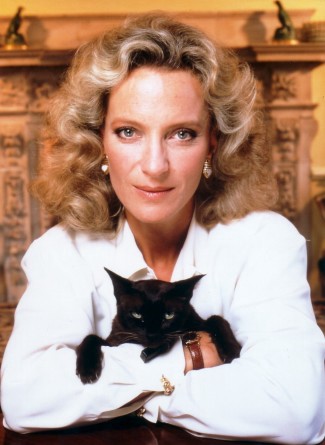
A series dedicated to explaining Britain’s manufactured celebrities to an American audience.
To the index of woes humanity was blessedly spared last year — the Mayan apocalypse, a Romney-Ryan administration, the fiscal cliff, photos of Kate Winslet’s third wedding — we must add an event whose absence supplies a faint but joyous glimmer of hope in our brutal world. I refer, dear readers, to Her Royal Highness Princess Michael of Kent’s fourth literary effort and debut novel, The Queen of Four Kingdoms. This reportedly completed tale of warring royals in 15th-century France, featuring “many colourful and also dangerous characters,” has failed to appear despite a promised “release date” of 2012. Now, you know me: I’d normally consider it bad form to indulge in wild speculation vis-à-vis another’s affairs. Yet this latest blip in the checkered career of Princess Pushy — née Baroness Marie Christine Anna Agnes Hedwig Ida von Reibnitz, MC to her friends — has implications of such relevance to the public interest as to eclipse the demands of manners. For instance: could it be that in our democratic insta-fame era, where a willingness to have one’s personal travails scripted demi-literately by TV networks trumps all else, 67-year-old Marie-Christine’s posh title and ancient pedigree are no longer deemed worthy grounds to publish work that would — just guessing, of course — otherwise languish permanently in slush piles? True, it’s not quite a revolutionary overthrow of the Monarchy and the establishment of a classless republic, but it’s a start.
Or on a less utopian note, perhaps it was decided that extra precautions should be taken in order to avoid a repeat of the plagiarism charges that previously marred the Princess’s success as (what we’ll kindly term) a historian. Her first book, Crowned In a Far Country: Eight Royal Brides, published in the 1980s by Weidenfeld and Nicolson — Lord Weidenfeld and MC are pals — turned out to contain passages lifted almost verbatim from other works, and at least one author was awarded an out-of-court settlement. Liberal borrowing notwithstanding, it must be said that MC’s distinct voice shines through. As the Kirkus reviewer discovered, in these “tales of poor little princesses married off abroad…Princess Michael cannot shed or even conceal her belief that royalty are just better than the rest of us.”
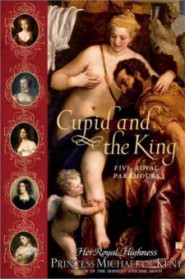
For most of us mere peasants, as MC affectionately calls the plebeian masses, a plagiarism scandal would be so mortifying, we’d painstakingly ensure the originality of every word we ever wrote henceforth. But the Princess is gifted with a most fortunate attribute: a pathological incapacity for embarrassment. (One anecdote has her casually strolling into a formal dinner with the Queen, 40 minutes late, and magnanimously saying to the amazed gathering, “Please don’t get up, anyone.”) Thus her follow-up, another lightweight historical biography entitled Cupid and the King: Five Royal Paramours, was also peppered with unattributed sentences, in response to which the Princess blamed a careless researcher who’d supposedly provided notes without proper citation. Cupid and the King was rather plagued with trouble from the start: when the manuscript, under contract to publisher Michael Joseph, was submitted several months late, they rejected it and demanded back the $130,000 advance. HarperCollins published the book in the end, but the incident no doubt made the Princess more nostalgic than ever for the days of her ancestors, when such treasonous insurrection would have elicited a swift beheading. As she has said: “I live in the 18th century in my mind” — although not, presumably, when she’s being wheeled into a high-tech operating theater for one of her routine nip-and-tucks.
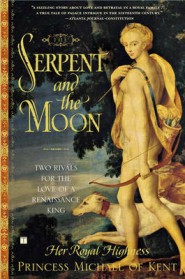
Asked back then why she’d embarked upon a writing career, the Princess simply said, “everybody needs money.” Indeed, the subject of money — her relative lack of it, her willingness to hustle in fairly unseemly fashion to access it — has been a constant theme of the chatter surrounding Marie-Christine and her husband, Prince Michael of Kent. They married in 1978 and have two children: Lady Gabriella, 31, an anthropology PhD student at Oxford, and Lord Frederick, 33, a cocaine-snorting party boy-turned-analyst at JP Morgan who’s married to the actress Sophie Winkleman (beloved as Big Suze off of “Peep Show”). Both Prince Michael and his wife are royal through and through: he’s the Queen’s first cousin and the grandson of King George V, while MC was born to a German baron and a Hungarian countess, and can trace her lineage back to various notable tyrants of Euro-nobility, including Catherine the Great, William the Conqueror, and Marie Antoinette. “Deep down inside me,” she has said, “I always hear my mother’s words: 900 years of breeding must be worth something.” An oft-repeated story is that when Prince Philip’s uncle, Lord “Dickie” Mountbatten, was proposing Marie-Christine as a wife for Michael, the Queen retorted that “she sounds a bit too grand for us.” Alas, MC’s grandeur wasn’t accompanied by wealth, and much to her perpetual chagrin the Kents are not on the Civil List, thereby receiving no subsidies from the public purse. So the “Rent-a-Kents” — as they’ve long been dubbed on account of their willingness to lend a royal touch to any occasion, as long as there’s something in it for them — must schmooze and glad-hand and cultivate the rich and powerful, even if that entails the odd lapse in discernment regarding the types with whom they associate.

A particularly dubious alliance to recently hit the headlines was the financial arrangement shared by Prince Michael and Boris Berezovsky, the exiled Russian oligarch whom we last met during his stratospheric-stakes litigation against fellow oligarch Roman Abramovich. In May, it emerged that over the course of a six-year period in the 2000s, Berezovsky sent the Prince around half a million dollars from his offshore accounts, purely as a kind gift to a good friend, the Russian claimed. It’s not so strange that the two men would know each other: as a collateral descendant of Tsar Nicholas II (the last Emperor of Russia, murdered by Lenin), Michael is a fluent Russian speaker and is the official patron of various Russian charities, none of which means Queen Liz didn’t choke on her morning G&T; on hearing that a close relative was on Berezovsky’s payroll. The 66-year-old “retired high net worth individual” (his politely-phrased occupation per Wikipedia) has been linked to several notorious murders, is mortal enemies with President Putin, and was dismissed by the judge in the Abramovich trial as someone who viewed truth “as a transitory, flexible concept, which could be moulded to suit his current purposes.” Still, touchingly loyal to bottomless pits of cash, the Kents were quick to assure the press — via an intermediary, naturally — that Boris remains their chum, because friendship “is certainly not a transitory and flexible concept so far as the prince and princess are concerned.”
Sadly for the Princess but fascinatingly for conspiracy theorists, just a week after the “Kentski” story broke, the bullet-ridden body of her close friend Mikhail Kravchenko, a 46-year-old furniture tycoon, was discovered in a pool of blood next to his Mercedes in a suburb of Moscow. MC and Kravchenko — once named by Russian Cosmopolitan, no less, as one of the country’s 20 most eligible bachelors — caused an international sensation in 2006 when they were photographed on a romantic jaunt in Venice, promenading hand in hand, browsing in boutiques, taking gondola rides, and gazing beatifically into each other’s eyes. The lovebirds stayed in adjoining £2200-a-night suites at the Hotel Cipriani — MC checked in as “Mrs. Green,” and her companion picked up the tab — but, insisted the Princess, insinuations that anything clandestine occurred, or that their hand-holding was more than an innocent expression of friendship, were outrageous. Not that any red-blooded bloke wouldn’t jump at the chance, you understand: “Of course Mikhail finds me attractive and beguiling. Men are charmed by me, and in return I am a very tactile woman. Why can’t people show some respect?”
Various possible instigators of the professional hit on Kravchenko have been subtly and not so subtly alluded to, including Putin, who’s likely peeved by the Kents public support of Berezovsky; Kravchenko’s rivals in Russia’s cut-throat and practically lawless business world, where most tycoons find it necessary to employ 24-hour bodyguards; and, because no one with even the vaguest connection to the British royal family can suffer an untimely death without the finger being pointed at MI6, it’s even been suggested that Kravchenko was planning a “tell-all” book and therefore had to be silenced.
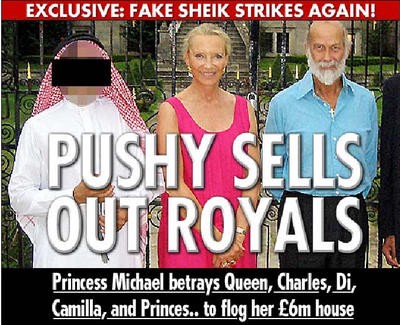
The latter theory, however, implies that MC’s penchant for brazenly indiscreet extra-marital dalliances somehow falls outside common knowledge, which is a bit like suggesting that the public would be astounded to hear of Nicole Kidman’s familiarity with the business end of a Botox needle. During her marriage to Michael (which, incidentally, is her second; inquiries about her first, to Old Etonian banker Thomas Troubridge, are imperiously stonewalled with “We don’t talk about that”) she has enjoyed documented flings with John Warner, the former senator and Elizabeth Taylor’s sixth husband, and Ward Hunt, a Texan oil tycoon whose torrid involvement with the Princess led to the News of the World front page headline PRINCESS MICHAEL TORN BETWEEN PRINCE AND HER DALLAS MILLIONAIRE. There have also been “close friendships” with the likes of billionaire arms dealer and shady oil baron Dr. Marino Chiavelli, late American philanthropist John Galbreath, and English entrepreneur Peter de Savary, who gave MC the trifling little compliment of a plot of land on Antigua worth £150,000. Suffice it say that when it comes to the men she gravitates toward, you can’t accuse MC of inconsistency.
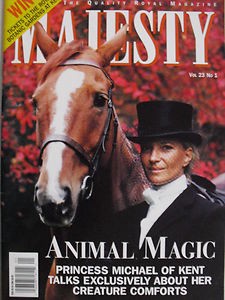
MC’s obsession with money is said to derive from her modest childhood, and her belief that she was cheated of the lavish, wealth-cushioned existence that is her birthright. “She loved to have bank-notes around her,” her former private secretary, John Barratt, once revealed. “She loved its smell and feel — she would keep wads of it in her handbag. Her need for it was almost primeval.” Born in German-populated Karlsbad — now the Czech Republic — Marie-Christine was just a few months old when WWII was ending and the Russian army was advancing, forcing the von Reibnitzes to take their baby girl and her older brother, abandon their estates, jewels and heirlooms, and flee in a handcart. The family settled briefly in American-occupied Bavaria, but Baron von Reibnitz, a former SS member and crony of Gestapo founder Hermann Goering, faced being summoned to an Allied de-Nazification court. He hightailed it to Mozambique, where his wife, the Countess Marianna, declined to follow. They divorced, and pragmatic Marianna took the children to live in the safe haven of Australia, where she apparently ran a hairdressing salon. Needless to say, despite living in Sydney until her late teens, MC has assiduously renounced all traces of an Australian accent, cultivating tones that are pure Eurotrash. As for her mother owning a salon, she denies this but, to paraphrase Mandy Rice Davies’ famous remark in the Profumo trial: well, she would, wouldn’t she?
And actually, MC has clearly inherited her mother’s resourcefulness and talent for self-preservation. As a young woman she made a living as an interior designer, and later in life she was able to charge hefty fees on the lecture and after dinner circuit. Her speeches, typically based on her books, were especially popular in the US — that is, until she was plunged into disgrace following an incident that suggested she’s just as much a chip off the old paternal block. As many will recall, in 2004 the Princess was out with friends at West Village restaurant Da Silvano, when she became enraged by the noise coming from a nearby table and shouted at them to be quiet. “I thought she was just a crazy woman,” one of the men at whom her tantrum was directed, TV host A.J. Calloway, later said. “I still think she’s a crazy woman.” Then, when proprietor Silvano Marchetto moved MC’s party to a different section of the restaurant, she leaned over and angrily said to the gathering, all of whom were black, “You need to go back to the colonies.” A flurry of indignant denials that MC was in any way racist — she’ll have you know that she once wore blackface to ride the bus in Mozambique, so how could she be? — were somewhat diminished in force when she told a newspaper about her run-in with “a group of rappers.” (Calloway was with a banker, a lawyer, a music mogul and a TV reporter.)
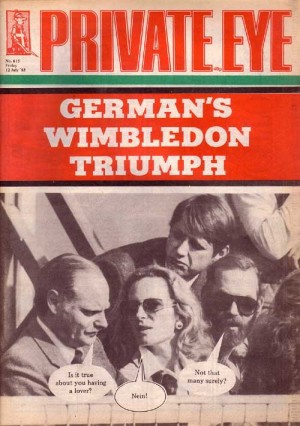
Not surprisingly, the speaking invites from American organizations were fairly thin on the ground after that, but there’ve been ominous signs that the Princess may be bouncing back from her persona non grata status in the US. The 25th anniversary gala of the Smithsonian’s Arthur M. Sackler Gallery of Asian art and antiquities was graced with her presence in November, and last month she participated in a symposium on East-West dialogue at the Metropolitan Museum of Art. Taking the opportunity to upbraid “70 per cent of your Congress” for not having passports, she wondered incredulously “how can you communicate if you’ve never been there?” Yeah, listen, Secretary Clinton: if only your provincial cohort could mix with people from other cultures as readily as MC does, all our problems would be solved. Just look at the cordial association she shares with the Met event sponsor, Shafik Gabr, an Egyptian art collector whose friendship would be just as precious to the Princess were he not a billionaire, and I won’t hear otherwise.
Even if MC decides not to make a permanent foray into smoothing over the West’s relations with the Middle East (although given the region’s luck lately, I wouldn’t count on it) she may nevertheless be spreading her influence via primetime TV. In 2011, she announced that her third book, The Serpent and the Moon: Two Rivals for the Love of a Renaissance King, had been optioned for an eight-part series, and that she’d commandeered “Downton Abbey” creator Julian Fellowes to write it. (Fellowes’ aristocratic wife, Emma Joy Kitchener, is a lady-in-waiting to the Princess.) But whereas “Downton” has somehow managed to convey the notion that while the old upstairs-downstairs system was jolly worthwhile, grate-scrubbers and potato-peelers are people too, Fellowes will have his work cut out extracting anything like as palatable a philosophy from MC’s take on history. After all, this is a woman who, in conversation with some primate biologists, remarked triumphantly: “I always knew that when people who aren’t like us claim that hereditary rank is not part of human nature, they must be wrong. Now you have given me evolutionary proof!”
Previously: The Crazy Days Of Sadie Frost
Emma Garman is on Tumblr and Twitter. 2011 photo by Featureflash, via Shutterstock.com.
